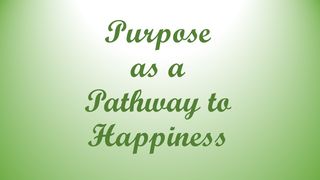Forgiveness
9 Purposes for Your Life When You Forgive
Quite often people develop a new sense of purpose after they have forgiven.
Posted May 14, 2020 Reviewed by Jessica Schrader

As you forgive, your sense of why you are here, and then acting on this, may be a surprising new development for you. This clearer emergence of "why you are here" is what we call purpose.
Purpose is different from finding meaning. When you find meaning in the context of forgiveness following injustice, this is more of a thinking exercise. You strive to figure out the importance that this struggle to overcome suffering has had for you. Purpose, in contrast, is more action-oriented as you bring good to other people.
I see nine different purposes to life once people begin to take forgiveness seriously. These are drawn from my book, 8 Keys to Forgiveness.
Which of the nine purposes characterize you?
Purpose 1: To Practice Forgiveness in a Loving Way as an End in Itself Because It Is Good
Part of your new life now can be to practice forgiveness often, as it becomes a part of who you are. Forgiveness can be part of your new way of seeing, part of your new actions toward others, and part of your heart. You now can begin to see all people as possessing inherent worth.
Purpose 2: To Protect Loved Ones From Your Emotional Wounds
Forgiveness offers protection not only for you as the forgiver but also to your loved ones. When you are fuming with resentment, you can displace all of that emotion onto others. You now want to stop transferring that anger as you deliberately choose forgiveness as a way to protect others from that anger.
Purpose 3: To Help the Person Who Is Unjust See the Error of His or Her Ways
As you forgive, you want to prevent the increase of more anger building up in you and in the one who injured you. This, then, becomes a gift to those who hurt you because you are willingly taking steps not to hurt them.
Purpose 4: To Help the Other Grow in Character
As you show love for your injurer, you may be opening a door that has not been unlocked for a long time within that other person. If you are able, then giving this love to those who hurt you could change their lives.
Purpose 5: To Reconcile With the One Who Hurt You
As you forgive, and if it is safe to do so, you can choose to work toward reconciling with the one who was unfair to you. If the injurer refuses, know that you have done your best.

Purpose 6: To Grow in Character Yourself
As you forgive, you may begin to see that you can continue to grow in many of the moral virtues such as justice, patience, and kindness. You will see that you do not practice each virtue in isolation from the other virtues. They all work together for good.
Purpose 7: To Create an Atmosphere of Forgiveness in the Home
You will not want to keep your understanding of the importance of forgiveness to yourself as you practice it often. You likely will want to give forgiveness away to others. Your family is a great place to start. Try to set aside some time so that family members can discuss themes of forgiveness. Be aware of teachable moments about this with children and adolescents.
Purpose 8: To Create an Atmosphere of Forgiveness in the Workplace, in Worship Communities, and in Social or Other Communities
Anger in one person's heart can jump to others. This often starts in the family, but it can then be transported to the workplace in which unsuspecting colleagues are the recipients of that anger. The anger that starts in the family can be brought to school by the children. Resentment then can spread in a community until there are norms that accept harshness, increasing stress and unhappiness. You can make a commitment to put more patience and kindness into your various exchanges with others outside of the family context.
Purpose 9: To Protect Future Generations From Unhealthy Anger
Still more protection for other people can occur when forgiveness is practiced as a lifestyle. Think of anger as a kind of virus, spreading to other people now, and then moving across time to others. A child born today could be the recipient of this passed-on anger in school 10 years from now as a teacher or another student brings this "virus" of anger to the classroom. The anger, perhaps started by a grandparent 40 years ago, will now come to the school by the grandchild. Now the child bullied in school may bring that anger to his own family when he is 25 years old. On and on, the anger goes. Forgiveness, when done right, may stop this generational transmission of anger and protect others from all of this pain, which is so unnecessary and potentially destructive.
I hope you see that forgiveness can be a resilient way of rising up out of discouragement and anger so that you as forgiver can lead a life of happiness as you aid others in their happiness.
References
Enright, R. 8 Keys to Forgiveness. New York: W. W. Norton & Company.




